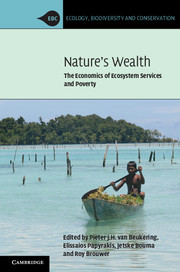Book contents
- Frontmatter
- Contents
- List of contributors
- Acknowledgements
- 1 The economics of ecosystem services and poverty
- Part I Biodiversity-related ecosystem services
- Part II Marine-related ecosystem services
- Part III Forest-related ecosystem services
- Part IV Water-related ecosystem services
- 12 Small-scale water harvesting and household poverty in northern Ethiopia
- 13 Water services, dam management and poverty in the Inner Niger Delta in Mali
- 14 The environmental and social impacts of flood defences in rural Bangladesh
- 15 Double dividends of additional water charges in South Africa
- Part V Land-related ecosystem services
- Index
- References
14 - The environmental and social impacts of flood defences in rural Bangladesh
Published online by Cambridge University Press: 05 July 2013
- Frontmatter
- Contents
- List of contributors
- Acknowledgements
- 1 The economics of ecosystem services and poverty
- Part I Biodiversity-related ecosystem services
- Part II Marine-related ecosystem services
- Part III Forest-related ecosystem services
- Part IV Water-related ecosystem services
- 12 Small-scale water harvesting and household poverty in northern Ethiopia
- 13 Water services, dam management and poverty in the Inner Niger Delta in Mali
- 14 The environmental and social impacts of flood defences in rural Bangladesh
- 15 Double dividends of additional water charges in South Africa
- Part V Land-related ecosystem services
- Index
- References
Summary
Introduction
Flood mitigation is clearly a very important issue for Bangladesh. It is highly related to other high priority policy goals such as food security. As a result, protection against flooding has often been combined with efforts to intensify agricultural production. Most of the flood control projects in Bangladesh are so-called ‘flood control, drainage, and irrigation’ projects. These projects have recovered thousands of hectares of land from the floodplain through the construction of dykes or embankments. However, this measure has come under criticism because: (1) it provides benefits in terms of increased agricultural productivity and is therefore biased towards landowners; (2) it has resulted in a long run decline in soil fertility due to the cessation of sediment deposition on land during flood; (3) it prohibits the migration and spawning of fish, and thereby reduces overall fish stocks and the livelihood of fishers; (4) flood control embankments also hinder water transportation because they prevent free water flows between rivers within and outside embankments. Consequently, flood control projects often reduce the incomes of water transportation workers and force some to leave this sector.
Thus the construction of flood protection embankments has a complex pattern of positive and negative impacts for different sections and occupational groups within the affected population. Some of these impacts are through environmental channels. As mentioned above, fish stocks are negatively affected by the presence of embankments, which affects the livelihoods of those engaged in capture fisheries. This is a big problem because fisher communities in Bangladesh are generally one of the poorest occupation groups. Similarly, negatively affected people engaged in water transportation also tend to be from the poorest strata in the community.
- Type
- Chapter
- Information
- Nature's WealthThe Economics of Ecosystem Services and Poverty, pp. 296 - 314Publisher: Cambridge University PressPrint publication year: 2013

